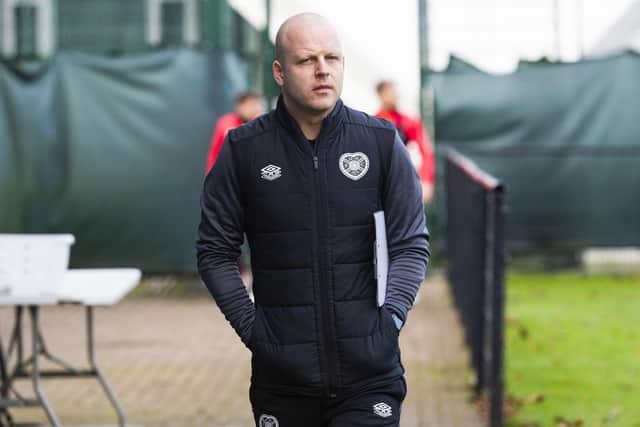Hearts' Steven Naismith calls for VAR patience and tells clubs with agendas to 'stop throwing mud at the system'
Hearts manager Steven Naismith says Scottish football needs to stick by VAR and that everybody involved must show patience with the technology.
The former Scotland internationalist also believes certain clubs need to put their “individual agendas” to one side when it comes to letting officials get to grips with the new way of working.
Advertisement
Hide AdAdvertisement
Hide AdVAR has come under scrutiny once again after an independent review commissioned by the Scottish Football Association found that 13 incorrect VAR outcomes had occurred in the second full round of cinch Premiership fixtures. Four of those centre around incidents in Hearts matches, of which three – penalty awards against Motherwell and St Johnstone plus a red card against Kilmarnock – would have benefitted the Jambos if given. Hearts midfielder Beni Baningime should also have been sent off during a match against Aberdeen in December, according to the review.


Nevertheless, Naismith feels VAR is a beneficial tool for Scottish football. “Ultimately, is it good for the game or is not?” said Naismith. “I think it's good and that's from my position as somebody who is associated with a team where the decisions impact us first-hand. I think we've been one of the teams that have been hit by the issues, if you like, more than most. But as the stats say, we are getting more decisions right than we did before. If we never won a cup on the back of a bad decision that VAR could have helped, that's not good for me. It impacts the value and entertainment for fans one hundred per cent, but for me we need to get the better decisions.
“The bad the decisions haven't been VAR, it's the decision-making and the consistency level of that. And when something is new, that's always going to happen. I think we need to look at that at times because some of the decisions have been really poor – or the outcome of the decisions have been really poor. So I think it's more about that but I think we also have to give it time, give it time to get better, how we maybe use it and that there might be a better set-up in some way.”
Naismith also hinted that progress is being hampered by clubs complaining about the technology. “There's also been a lot of people's individual agendas suiting to throw mud at the system and the process when every club knows what the process is,” Naismith continued. “’Oh why is this not happening and why is the guy not saying into the earpiece’. All those comments are just fuelled by individual agenda. It's not fuelled by fact or understanding of what the process is for every decision. It takes a bit longer at times, yes, but until it's slick and we've got the experience, it's going to take time.”
Naismith is reluctant to put a timescale on when VAR should be perfected. “I don’t think you can put a date on it,” he added. “I think we need to see progression all the time. If you look at the English league, who had it before us and who spend more money on their referees and their governing body, and they are still getting issues. But I think they will say they are in a better place now than they were at the start. As long as we are seeing improvement. At the start of the season they were looking at three decisions and now it is up to 13. That’s going the wrong way so that needs to be addressed. But if we are slowly getting it quicker and getting fewer bad decisions, then that’s progression. That’s helping the game.”
